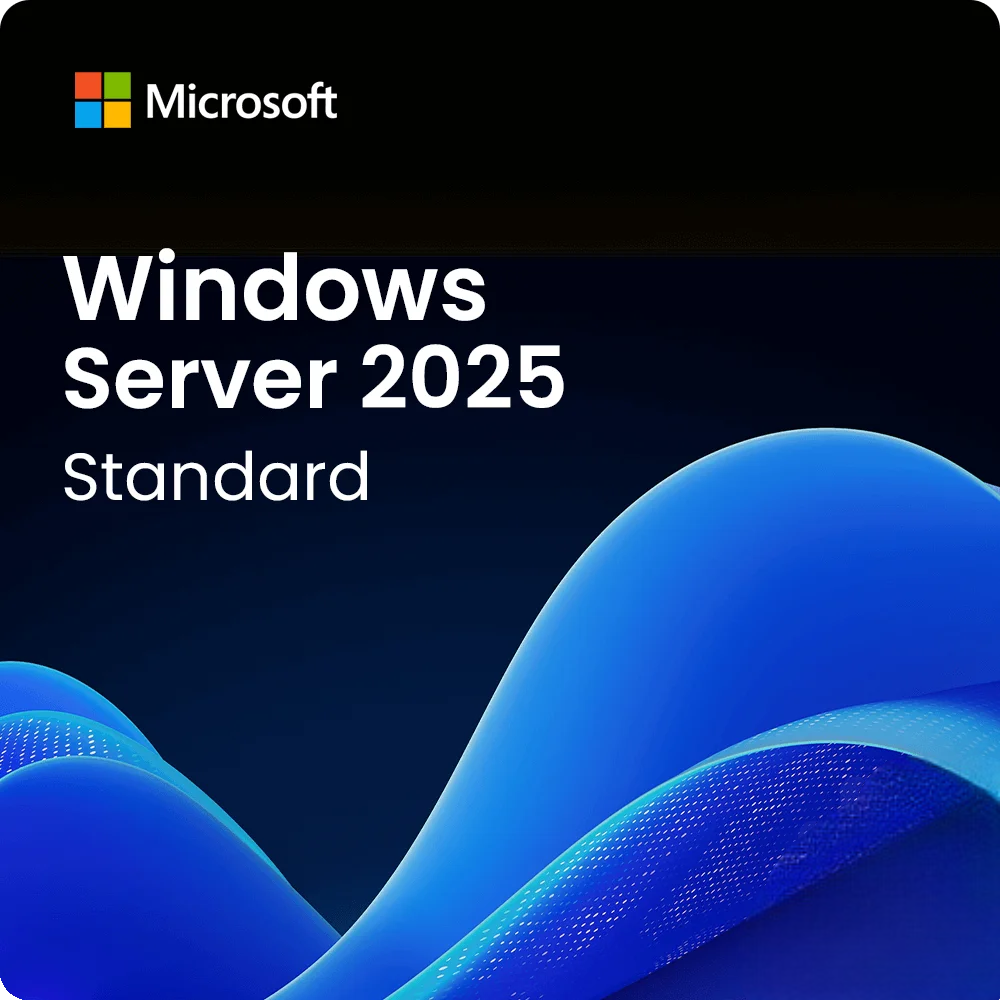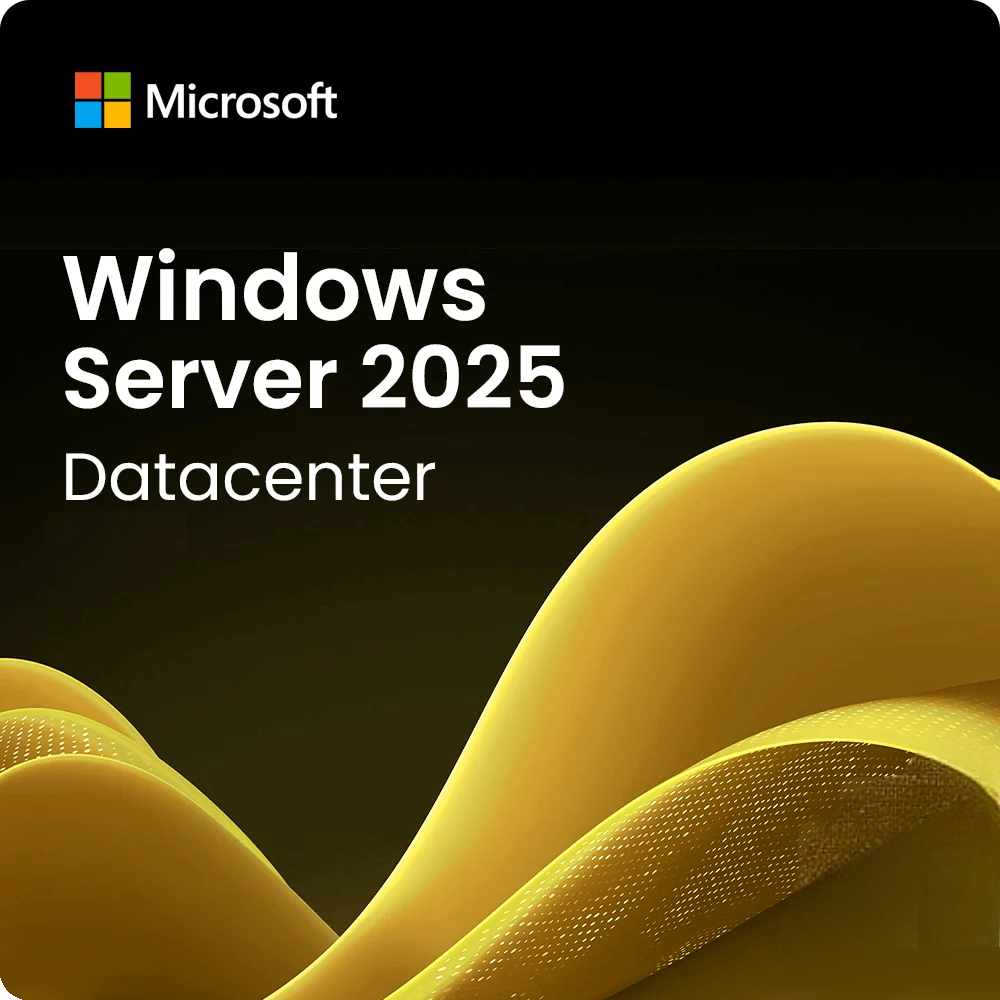Windows Server 2025 Standard - Device CALs

Guaranteed Authenticity
All our softwares are 100% authentic, directly from official manufacturers.
Warranty
Enjoy peace of mind with our during the product's validity warranty, far beyond the standard 30 days.
Free Installation
Enjoy a free installation service for a hassle-free setup.
24/7 Customer Support
Our dedicated team is available anytime to assist you.
Best Prices
Get the best prices: CAD51.99!
Description
Windows Server 2025 Standard - Device CALs: An Overview
Efficient Licensing:One CAL per device, regardless of the number of users, which is particularly cost-effective in environments with rotating teams or shared workstations.
Enhanced Security:Built-in threat detection and protection mechanisms ensure the security of sensitive company data and compliance with security policies.
Seamless Integration:The Device CAL integrates seamlessly with existing Windows Server 2025 environments, supporting a wide range of Microsoft and third-party applications, improving efficiency and interoperability.
Scalability:Ideal for businesses of all sizes, this license allows easy adaptation to growing needs and increasing numbers of users.
Increased Productivity: Optimized access to remote desktops and applications fosters collaboration and efficiency within teams.
Microsoft Windows Server 2025 - Device CALs: Effective and Secure Client Access License for Your Devices
The Microsoft Windows Server 2025 Device Client Access License (CAL) is an ideal solution for businesses seeking to provide their devices with secure and efficient access to the powerful features of Windows Server 2025. This licensing option allows a specific device, regardless of the number of users, to access server resources and services. It is particularly useful in work environments where multiple employees share the same device.
What is a Device CAL for Windows Server 2025?
The Device CAL (Client Access License) for Windows Server 2025 is a license that allows a device to access Windows Server 2025 services. This type of license is particularly suited for businesses where multiple users share the same device, such as team workers or workstations used by different employees.
Why Do You Need a Device CAL for Windows Server 2025?
Increased Security and Control:
With the Device CAL for Windows Server 2025, you can strictly control which devices access your server resources. This enables more effective monitoring of access and ensures that only authorized devices are connected, thereby reducing security breaches and unauthorized access risks.
Efficient Resource Management:
Using Device CALs allows businesses to optimize their resources by avoiding the purchase of multiple licenses for each user. If multiple people use the same device, a Device CAL is more cost-effective than a User CAL, as it limits server access to the device rather than the individual.
Scalability for Growing Businesses:
The Device CAL for Windows Server 2025 provides the flexibility and scalability needed for expanding businesses. It is easy to add new devices without having to purchase licenses for each user, simplifying the management and expansion of your infrastructure.
Benefits of Device CAL for Windows Server 2025
Cost Reduction:
One of the main advantages of Device CALs is the potential for savings. If your employees work in shifts or if multiple people share the same device, a single Device CAL per device is sufficient, unlike purchasing multiple user licenses.
Simplified License Management:
License management can be complex and time-consuming. Device CALs simplify this process, as you only need to manage the devices accessing your server resources. This can be particularly useful in large organizations with many users and devices.
Support for Remote Work:
In the current context where remote work is becoming more common, it is crucial that your IT infrastructure is flexible and secure. The Device CAL for Windows Server 2025 allows devices to securely and efficiently access server resources, regardless of location, thus facilitating productivity and remote collaboration.
Comparison: Device CAL vs. User CAL
Flexibility: Device CALs are ideal for businesses where multiple users share the same device. User CALs are better suited when individual users use multiple devices. The choice between these two types of CAL depends on how your employees access server resources.
Budget Considerations: Device CALs can be more economical if multiple users share a device. Conversely, User CALs may incur higher costs when each user uses multiple devices. Analyzing your business's specific needs will help determine the most cost-effective solution.
Administrative Management: Device CALs simplify license management, as you only need to manage the devices. User CALs require more detailed monitoring of users and their access rights. Your choice will also depend on the level of management you are willing to dedicate to your licenses.
Best Practices for Using Device CALs
Regular License Usage Review:
To ensure compliance and adequate license quantities, regularly review your CAL usage through internal audits or license management tools.
IT Staff Training:
Ensure that your IT staff is well-trained in managing and configuring CALs. This helps avoid errors and improves license management efficiency.
Use of License Management Tools:
Various software tools are available to manage your licenses effectively. These tools offer features such as automatic monitoring, reporting, and alerts for license shortages or compliance risks.
Secure and Reliable: Device CAL for Windows Server 2025
The Device CAL for Windows Server 2025 is a key component for any business looking to maximize the efficiency and security of its IT infrastructure. With benefits such as cost optimization, simplified license management, and support for remote work, it is a prudent choice. By implementing rigorous management, you can ensure that your server resources are utilized optimally, providing your business with a solid foundation for the future.
System Requirements
| Category | Minimum Requirements | Recommended Requirements |
|---|---|---|
| Processor | 64-bit processor at 1.4 GHz | Multi-core 64-bit processor at 3.1 GHz |
| RAM | 2 GB RAM | 8 GB RAM or more |
| Disk Space | 32 GB of free space | 64 GB or more of free space |
| Network | Ethernet adapter, Gigabit support | Ethernet adapter, Gigabit support |
| OperatingSystem | Windows Server 2025 Standard or Datacenter | Windows Server 2025 Standard or Datacenter |
Frequently Asked Questions About Windows Server 2025 Standard - Device CALs
-
What happens if a device is replaced?
If a device is decommissioned or replaced, you can transfer the corresponding Device CAL to a new device. This protects your investment and allows you to adapt easily to changes in your IT infrastructure.
-
Are Device CALs compatible with previous versions of Windows Server?
Device CALs are generally version-specific. The Device CAL for Windows Server 2025 is designed for this version and is not compatible with previous versions. Make sure to use CALs that match your server version.
-
How many Device CALs do I need?
The number of Device CALs required depends on the number of devices accessing your server. You need to acquire one CAL for each device accessing the server. An accurate assessment of your devices and access needs will help determine the necessary licenses.
-
What is the validity period of Device CALs?
Device CALs typically do not expire and remain valid as long as you use the corresponding server version. However, when upgrading the server, you will also need to update your CALs.
Features
Windows server 2025 Product Comparison Chart
| Feature | Sub-feature |

|

|
|---|---|---|---|
| .NET Framework 3.5 Features | ✔ | ✔ | |
| .NET Framework 4.8 Features | ✔ | ✔ | |
| Activation | ✔ | ✔ | |
| Automatic Virtual Machine Activation | ⚠ 1 | ✔ | |
| Key Management Service (KMS) | ✔ | ✔ | |
| Active Directory Certificate Services | ✔ | ✔ | |
| Certificate Enrollment Policy Web Service | ✔ | ✔ | |
| Certificate Enrollment Web Service | ✔ | ✔ | |
| Certification Authority | ✔ | ✔ | |
| Certification Authority Web Enrollment | ✔ | ✔ | |
| Network Device Enrollment Service | ✔ | ✔ | |
| Online Responder | ✔ | ✔ | |
| Active Directory Domain Services | ✔ | ✔ | |
| Active Directory Federation Services | ✔ | ✔ | |
| Active Directory Lightweight Directory Services | ✔ | ✔ | |
| Active Directory Rights Management Services | ✔ | ✔ | |
| Azure Extended Networking | ❌ | ❌ | |
| Background Intelligent Transfer Service (BITS) | ✔ | ✔ | |
| BitLocker Drive Encryption | ✔ | ✔ | |
| BitLocker Network Unlock | ✔ 4 | ✔ 4 | |
| BranchCache | ✔ | ✔ | |
| Client for NFS | ✔ | ✔ | |
| Data Center Bridging | ✔ | ✔ | |
| Device Health Attestation | ✔ | ✔ | |
| DHCP Server | ✔ | ✔ | |
| Direct Play | ✔ 4 | ✔ 3 | |
| DLNA codecs and web media streaming | ✔ 4 | ✔ 3 | |
| DNS Server | ✔ | ✔ | |
| Enhanced Storage | ✔ | ✔ | |
| Failover Clustering | ✔ | ✔ | |
| Fax Server | ✔ | ✔ | |
| File and Storage Services | ✔ | ✔ | |
| BranchCache for Network Files | ✔ | ✔ | |
| Data Deduplication | ✔ | ✔ | |
| DFS Namespaces | ✔ | ✔ | |
| DFS Replication | ✔ | ✔ | |
| File Server | ✔ | ✔ | |
| File Server Resource Manager | ✔ | ✔ | |
| File Server VSS Agent Service | ✔ | ✔ | |
| iSCSI Target Server | ✔ | ✔ | |
| iSCSI Target Storage Provider (VDS and VSS hardware providers) | ✔ | ✔ | |
| Server for NFS | ✔ | ✔ | |
| SMB 1.0/CIFS File Sharing Support | ✔ | ✔ | |
| SMB Bandwidth Limit | ✔ | ✔ | |
| SMB over QUIC | ✔ | ✔ | |
| Work Folders | ✔ | ✔ | |
| Storage Migration Service | ✔ | ✔ | |
| Storage Migration Service Proxy | ✔ | ✔ | |
| Storage Spaces | ✔ | ✔ | |
| Storage Spaces Direct | ❌ | ✔ | |
| Storage Replica | ✔ | ✔ | |
| Group Policy Management | ✔ | ✔ | |
| Host Guardian Hyper-V Support | ❌ | ✔ | |
| Host Guardian Service | ✔ | ✔ | |
| Hotpatching | ✔5 | ✔5 | |
| I/O Quality of Service | ✔ | ✔ | |
| IIS Hostable Web Core | ✔ | ✔ | |
| IP Address Management (IPAM) Server | ✔ | ✔ | |
| Management OData IIS Extension | ✔ | ✔ | |
| Media Foundation | ✔ | ✔ | |
| Message Queuing | ✔ | ✔ | |
| Message Queuing DCOM Proxy | ✔ | ✔ | |
| Message Queuing Services | ✔ | ✔ | |
| Microsoft Defender Antivirus | ✔ | ✔ | |
| Multipath I/O | ✔ | ✔ | |
| MultiPoint Connector | ✔ | ✔ | |
| Network ATC | ✔ | ✔ | |
| Network Controller | ❌ | ✔ | |
| Network Load Balancing | ✔ | ✔ | |
| Network Policy and Access Services | ✔4 | ✔4 | |
| Network Virtualization | ✔ | ✔ | |
| Print and Document Services | ✔ | ✔ | |
| Internet Printing | ✔4 | ✔4 | |
| Line Printer Daemon (LPD) Service | ✔4 | ✔4 | |
| Print Server | ✔4 | ✔4 | |
| Quality Windows Audio Video Experience | ✔ | ✔ | |
| RAS Connection Manager Administration Kit (CMAK) | ✔ | ✔ | |
| Remote Access | ✔ | ✔ | |
| DirectAccess and VPN (RAS) | ✔ | ✔ | |
| Routing | ✔ | ✔ | |
| Web Application Proxy | ✔ | ✔ | |
| Remote Assistance | ✔4 | ✔4 | |
| Remote Desktop Services | ✔4 | ✔4 | |
| Remote Differential Compression | ✔ | ✔ | |
| Remote Server Administration Tools | ✔ | ✔ | |
| RPC over HTTP Proxy | ✔ | ✔ | |
| Setup and Boot Event Collection | ✔ | ✔ | |
| Simple TCP/IP Services | ✔4 | ✔4 | |
| SNMP Service | ✔ | ✔ | |
| Software Load Balancer | ✔ | ✔ | |
| System Data Archiver | ✔ | ✔ | |
| System Insights | ✔ | ✔ | |
| Telnet Client | ✔ | ✔ | |
| TFTP Client | ✔4 | ✔4 | |
| Virtualization | ✔ | ✔ | |
| Containers | ✔ | ✔ | |
| Hyper-V | ✔ | ✔ | |
| GPU Partitioning | ✔6 | ✔ | |
| VM Shielding Tools for Fabric Management | ✔ | ✔ | |
| Volume Activation Services | ✔ | ✔ | |
| Web Server (IIS) | ✔ | ✔ | |
| FTP Server | ✔ | ✔ | |
| Web Server | ✔ | ✔ | |
| WebDAV Redirector | ✔ | ✔ | |
| Windows Biometric Framework | ✔4 | ✔4 | |
| Windows Deployment Services | ✔ | ✔ | |
| Windows Identity Foundation 3.5 | ✔4 | ✔4 | |
| Windows Internal Database | ✔ | ✔ | |
| Windows PowerShell | ✔ | ✔ | |
| Windows PowerShell 2.0 Engine | ✔ | ✔ | |
| Windows PowerShell 5.1 | ✔ | ✔ | |
| Windows PowerShell Desired State Configuration Service | ✔ | ✔ | |
| Windows PowerShell Web Access | ✔ | ✔ | |
| Windows Process Activation Service | ✔ | ✔ | |
| Windows Search Service | ✔4 | ✔4 | |
| Windows Server Backup | ✔ | ✔ | |
| Windows Server Migration Tools | ✔ | ✔ | |
| Windows Server Update Services | ✔ | ✔ | |
| Windows Standards-Based Storage Management | ✔ | ✔ | |
| Windows Subsystem for Linux | ✔ | ✔ | |
| Windows TIFF IFilter | ✔4 | ✔4 | |
| WinRM IIS Extension | ✔ | ✔ | |
| WINS Server | ✔ | ✔ | |
| Wireless LAN Service | ✔ | ✔ | |
| WoW64 Support | ✔ | ✔ | |
| XPS Viewer | ✔4 | ✔4 | |
|
CAD559.99
See more
|
CAD6018.99
See more
|
As a guest if hosted on a virtualization host activated with Datacenter edition
Datacenter: Azure Edition can be used as a nested host or guest
Activated by Azure and can't be configured as a KMS host
When installed as Server with Desktop Experience
Available as an Azure Arc-enabled service. To learn more about Azure Arc pricing, see the Azure.
Available with Windows Server 2025 Standard, and is designed for standalone servers. Live migrate VMs between standalone nodes for planned downtime. If clustering is required for unplanned downtime, Windows Server 2025 Datacenter must be used instead.





